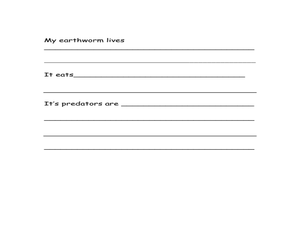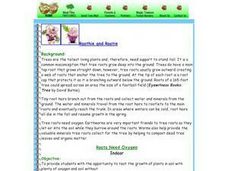Curated OER
How Long Until Dirt
Third graders examine the difference between composting and wasting food. They problem-solve what to do about leftovers after lunches so good food doesn't go to waste.They study food storage techniques that are environmentally friendly...
Curated OER
Rosa Parks Community Garden
Students explore gardening and nutrition in the Rosa Parks Community Garden. They work in stations to discuss food choices, the life cycles of plants, and mini-composting. After starting in one station, they rotate to try each activity.
Curated OER
Earthworms and Making a Wormery
Students explore the environment by researching insects. In this earthworm lesson, students utilize soil and plexiglass to build a see through wormery in which students can observe the worms at work. Students identify the benefits of...
Curated OER
Decomposition, Soil, and Life Cycle Research
Students conduct background research on the decomposition process, soil composition, and the life cycle using the resources provided for Internet searches. They work in collaborative groups to research topics as a particular plant, soil...
Curated OER
Contrasting Landscapes - UBC Farm Field Trip
Students visit the UBC Farm. In this lesson on various landscapes, students spend a day at the University of British Columbia exploring the farm and trail adjoining the campus. This lesson could be modified for use in any region that has...
Curated OER
Student Designed Investigations: Observations
Students choose an organism and create an experiment with that organism. In this observation lesson, students expose a living thing to something from its environment and record their observations. Students must have some prior knowledge...
Curated OER
Recycling Antonyms and Synonyms Worksheet
In this recycling learning exercise, students write antonyms and synonyms for common recycling vocabulary words. Students write antonyms and synonyms for 15 words.
Curated OER
Roots Need Oxygen
Students investigate the growth of plants in soil with oxygen and soil without oxygen. They discuss what roots need to survive, and chart the growth of two plants to analyze the difference between plain soil and soil with two earthworms.
University of Illinois
University of Illinois Extension: Urban Text: Adventures of Herman the Worm
WORMS- What are they? Where did they come from? If you are interested in Herman the Worm's family tree (biologically speaking), his body structures, or all the facts about him that you'll ever need, go to "The Adventures of Herman the...
Science Education Resource Center at Carleton College
Serc: Our Friend the Worm!: Introducing Worm Composting Into the Classroom
An activity for students to explore vermicomposting. Students will research worms and investigate how they can be used in composting in a classroom environment.
Other
Junior Master Gardener: Compost Critters
Try to guess the name of each insect, worm, or other small creature that lives in a compost bin. Clicking on each image leads to a page of detailed information about that species.
National Wildlife Federation
National Wildlife Federation: Worm Compost Bin
Composting not only helps to get rid of food and lawn waste but also helps to fertilize our garden. Find out how to set up a compost box in this brief, informative article.
Environmental Education for Kids
Eek!: Be the Change: Recipes for Composting
Some recipes for composting, with a link to how to compost with worms.
Better Planet Productions
Earth Care: Worm Wranglers [Pdf]
A lesson in worm composting for Grade Three.
Environmental Education for Kids
Eek!: Be the Change: How to Be a Vermiculturist
Learn all about worm composting in this article.













